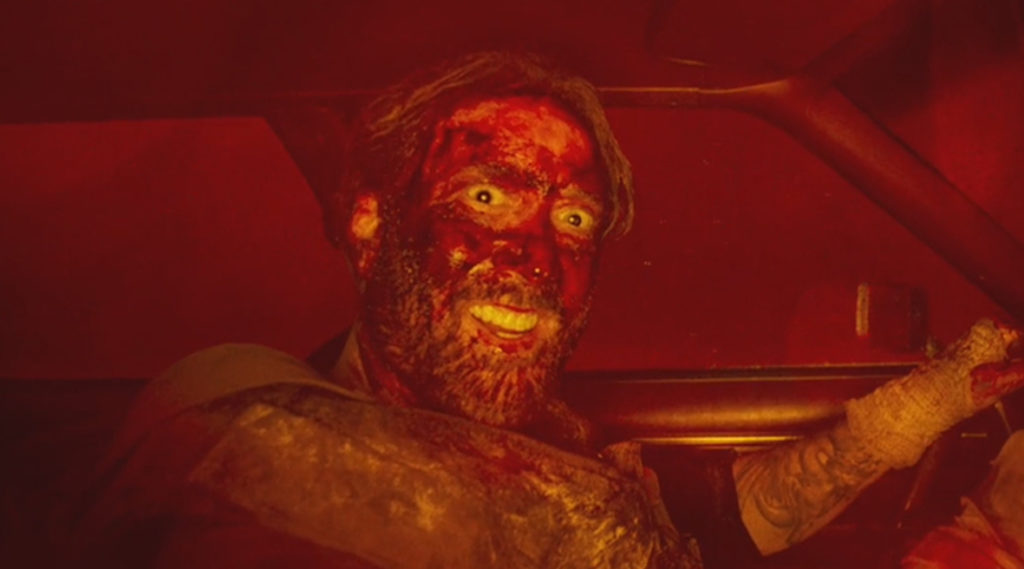
Mandy: The Hellscape We Create
“I’m just trying to rid the world of all these fevered egos that are tainting our collective unconscious and making us all pay a higher psychic price.”– Bill Hicks
In Mandy, the villains’ driving motivation is entitlement – no different than the current climate in American politics, with its trickle-down effects giving increased confidence to godless religious hucksters, corporate marauders, and all manner of shit-starters with a platform (our own personal Cheddar Goblins, vomiting a mess of hot mac-and-cheese over anything and everything in sight). With information – and our attention spans – reduced to the limiting parameters of a tweet, everything has become a chest-thumping, “because I can” provocation hiding behind the one-way glass of anonymity.
But therein lies the rub: is the current condition of America something that was orchestrated by the current administration (exacerbating a below-the-surface ugliness that was always festering), the result of social media being overrun by bots, or is it possible that the hellscape we currently occupy is something we created ourselves – an apocalyptic summit we’d be facing sooner or later?
If looked at as a corollary to our present state, Mandy concedes that it just might be.
On a visceral level, the film is the type of reactive, zero-tolerance riposte to current events that most are sorely in need of. It builds for an hour before getting darkly comedic and cathartic as fuck. As long as those with godlike delusions of power represent the ruling class, there will never not be a need for films like this. Much of it speaks to the existential struggles of the proletariat who haven’t yet lost their capacity for independent thought.
Life in the Garden
The couple exists in isolation, but finds comfort in their isolation. Their level of respect and admiration for one another is evident in spousal displays of affection toward creativity, the disclosure of personal details (including anecdotes that entail painful memories), and the fact that their home is a mostly-windows abstraction of erratic wooden framework. Their bedroom is comprised of ceiling-high windows on three sides, encroached upon by the dense forest outside. The couple has nothing to hide, their allegiance to each other a reflection of their covenant with the natural world surrounding them. The isolation suits them.
Red Miller (Nicolas Cage – Mom and Dad) is a lumberjack. Mandy (Andrea Riseborough – Nocturnal Animals) sketches, reads, and minds a quiet general store. They wear black T-shirts boasting the names of metal bands with metaphoric qualities. They also exist in the world of the early 1980s, an era many current horror filmmakers use to get cozy with a nostalgia that predates their own consciousness.
That said, director and co-writer Panos Cosmatos winks at the audience without conceding that the winks alone will carry the movie. His previous film – 2010’s Beyond the Black Rainbow– also took place in a lush yet foreboding psychedelic landscape, and centered on the notion of men desiring power and control over women. Both are set in 1983, which reinforces a theme of genesis. And, somehow, these stories exist within the same universe. (Which begs the question: in light of Gunngate, why hasn’t Marvel picked up the rotary and offered Cosmatos Guardians of the Galaxy Vol. 3?)
Destruction and Perception
There’s a death wish at the heart of Mandy…but it’s not Death Wish.
Red and Mandy dwell in their own personal Eden – a paradise they’ve created for themselves. It is when the outside world intrudes that things grow deadly. Like the current Administration, the villains in Mandy feel ordained by a higher power to take whatever they want (after all, God isn’t making an appearance to tell them otherwise – funny how that works).
Led by Jeremiah Sand (Linus Roache, from Antonia Bird’s Priest), the Children of the New Dawn carry beliefs as twisted in their purity as the followers in The Devils or Red State. Sand has learned how to harness his power as a master manipulator to get the cultists to serve his desires, which go to the extremes of kidnapping and murder. The film is compelling and maddening in its depiction of hypocrisy’s decadent allure. As Clarice Starling described Buffalo Bill in The Silence of the Lambs, “we covet what we see every day,” and that driving sense of entitlement provokes Jeremiah.
And then the red settles in.
So much red in this film: the red of rage; the red of blood; the red of a different plane of existence; the red of Red; and, finally, the red of the Valentine’s Day variety of love. No kidding.
Mandy: The Hellscape We Create (Part 2)
“God must be dead if you’re still alive.” – Dead Kennedys
A question I’ve struggled with since seeing the movie is, why call it Mandy?
That the plot structure – almost alwaysa woman’s death serving as the justification for a man’s vengeance – is filtered through a more surreal lens doesn’t change the fact that the scenario is familiar and overused.
Yet Riseborough’s exit is not an exit at all, but a transfiguration of sorts – along with the changing-every-second condition of the post-Mandy world Red inhabits, it fits that she adopts the role of a spirit guide. This recalls how the specter of Deborah Myers (Sheri Moon Zombie) acted as a conduit that centered Michael Myers’ pilgrimage back to Haddonfield in Rob Zombie’s Halloween II. Without Mandy’s aid, Red would also be set adrift in a world he no longer recognizes.
If he achieves godlike status by film’s end, then Mandy has ascended long since. Consider Riseborough’s placement on the movie poster – an ethereal presence presiding over the other characters; the final judge of all things.
A scene in Jeremiah’s lair is indicative of the type of egomaniac who thinks he’s owed something. In a turn of events as disturbing and uncomfortable as they are ironically funny, he wears a custom outfit that suggests he’s ready to take everyone for a ride in his figurative spaceship, before stripping naked and making himself vulnerable for all to see. It is when he receives an emasculating response that his true colors shine through – Mandy won’t go willingly into some demented game of “I’ll show you mine if you show me yours.”
In another corollary to our world, the reactions of small men called out on their bullshit bring about consequences fraught with hellfire.
Nicolas, Uncaged Once More
Up to this point, the film largely belongs to Riseborough, Roache, and the cultists. We’ve also been introduced to vague creatures that appear to be antecedents (or precursors, given the film’s timeline) to Clive Barker’s Cenobites, tricked out in attire from The Road Warrior. In a sequence destined for imitation, Red wanders through his empty home in a daze and pounds a bottle of vodka in the bathroom, the camera slowly pushing in as he totters between rage and sorrow, until only the former remains. It’s a tricky acting showcase, one that could have ventured into unintentional laughs if it were calibrated just a hair too far in either direction.
While Cage is called upon to freak out in grandstanding fashion, he is called upon just as often to be a silent, stoic presence. As if to underline the film’s metaphysical approach to revenge, one of Mandy’s most compelling sequences has Red carrying on a telepathic conversation with The Chemist (31’s Richard Brake). Face caked in blood like war paint, Cage is reduced to a thousand-yard stare that imparts all the information we need.
Red also resists the growing pains of a new notion of civilization stemming forth from an acid trip, and the primal savagery unleashed in the face of this is more “metal” than any horror film that’s blatantly about metal (Deathgasm; The Devil’s Candy). The Cenobites represent a distortion of the natural order as much as the cultists, and both groups’ fixation on submission and surrender of “the other” ensures that Red’s own status as “the other” is a match for their methods.
After infiltrating Sand’s compound, Red finds an altar with an open Bible; after a moment’s glance, he tosses the book aside – a subtle gesture that nonetheless raises a big middle finger to the charlatans who manipulate people through holier-than-thou pretenses. It’s both profound and bleakly funny – a disavowal of God’s flexibility on Earth. Minutes later, it’s fitting that Red verbally aligns himself with the Almighty, as he’s reached a point of self-actualization that transcends any earthly text.
Madness Restores Sanity
Cosmatos (and co-writer Aaron Stewart-Ahn) aims to elevate the tropes of revenge-thrillers to a place of spiritual necessity. Red’s reward, or so he hopes, is a restoration of the space that Mandy’s death leaves vacant in his soul. Only through the extermination of Jeremiah, the cultists, and the Cenobites does he have the potential to reconcile with himself. The emotions that drive his journey are dictated in a stream-of-consciousness manner, which makes Cosmatos’ fever-dream execution the perfect complement to Red’s mental state.
Jeremiah – who willingly sacrifices his own in order to self-preserve – isn’t at all different from the hypocrites in our own world: contracting out the heavy lifting to his followers and the Cenobites further his status as a small, insecure man with an Old Testament-sized ego. And, not unlike Hellraiser, Cosmatos and Stewart-Ahn understand that focusing on only a handful of characters gives the impending apocalypse a feeling of enormity – in the end, the world to which Red and the Children of the New Dawn wish to return has been changed beyond recognition through the clashing of their actions.
Sometimes, the only suitable reaction to a world submitting to its own deranged whims is a crazed smile of the Alfred E. Neuman variety. Mandy is maniacal and relentless, funny and visceral, and lingers in the mind’s eye long after viewing. Great horror takes us to the edge with things we’d have difficulty confronting otherwise – and this barrels headfirst into the abyss.
4.5 out of 5 far-out psychedelic red stars
The Plot Sickens: Check out Jonny Numb’s review of Hereditary!
Crash Analysis Support Team
Jonny Numb
 Jonny Numb (aka Jonathan Weidler) never learned how to swim, so he could care less if you close the beaches. He co-hosts THE LAST KNOCK podcast with Billy Crash, and can be found drowning in Twitter and Letterboxd @JonnyNumb.
Jonny Numb (aka Jonathan Weidler) never learned how to swim, so he could care less if you close the beaches. He co-hosts THE LAST KNOCK podcast with Billy Crash, and can be found drowning in Twitter and Letterboxd @JonnyNumb.
Get your Crash Palace and The Last Knock gear!
THE LAST KNOCK horror podcast is a Crash Palace Productions’ featured show. Besides this site, you can find THE LAST KNOCK on iTunes with new shows posted every other Sunday at 9 PM ET.
Crash Palace Productions website design and creation from Brian Yount Digital Enterprises with banner and THE LAST KNOCK art from Palko Designs.
(Mandy still of Nicholas Cage from ponapisach.pl.)

